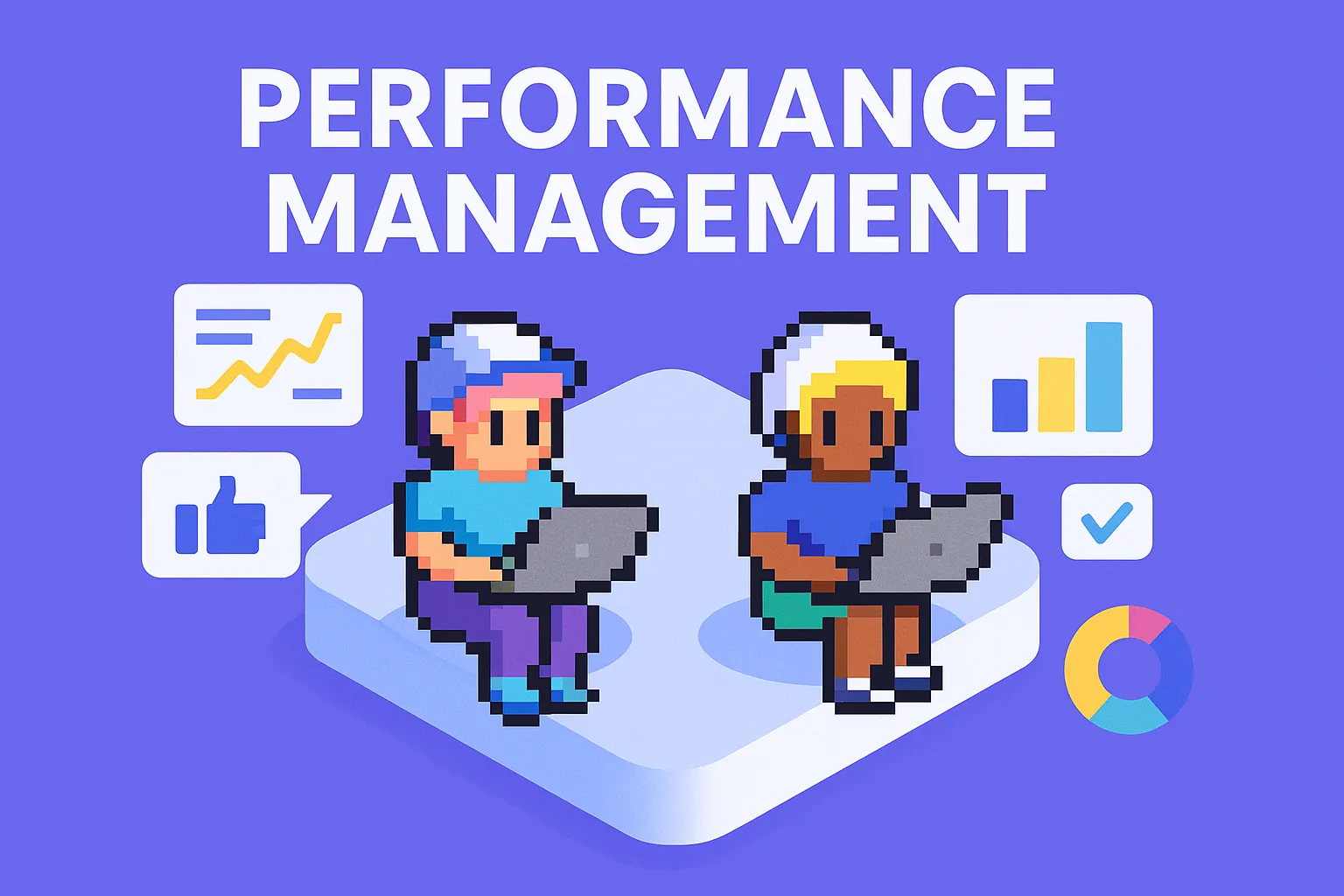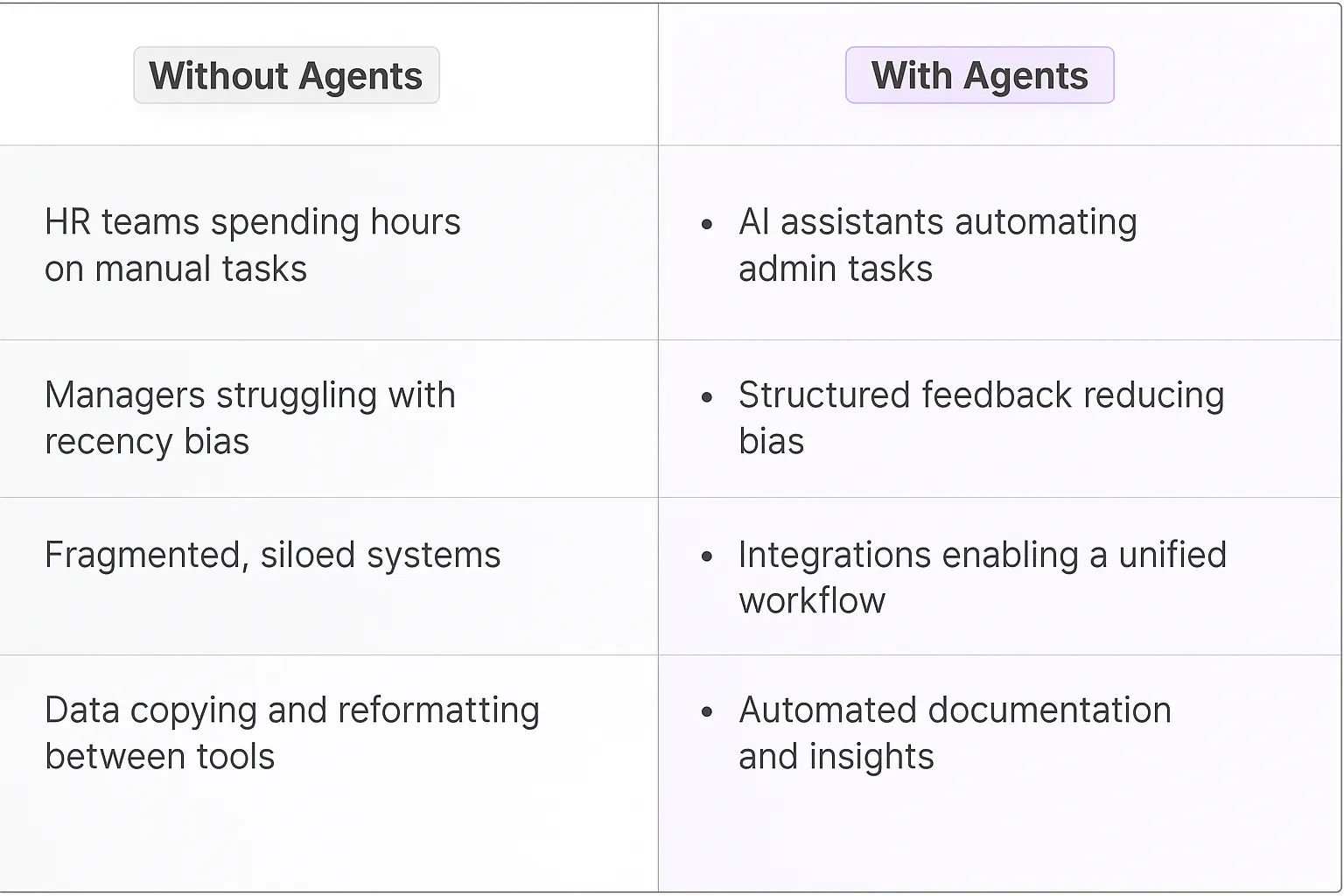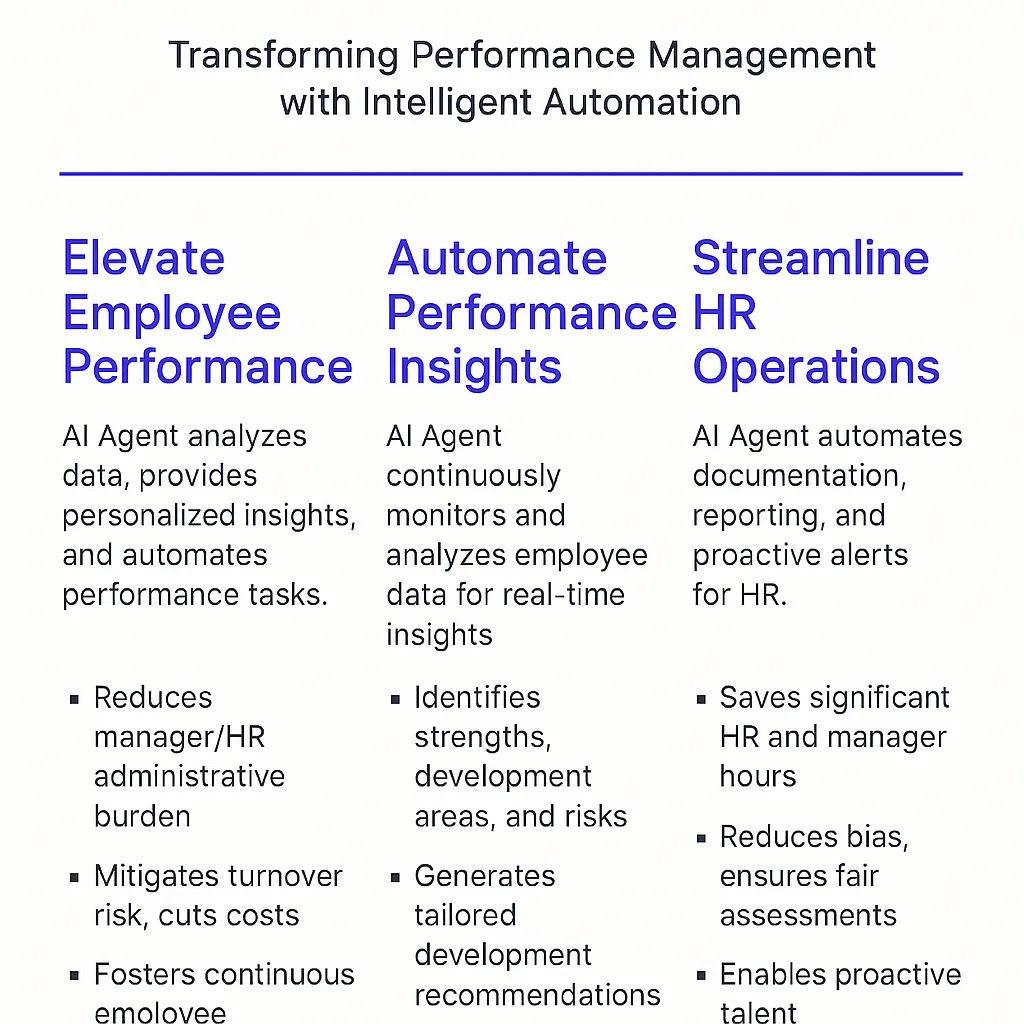Performance Management Specialist is an AI-powered system that transforms how organizations handle employee development and evaluation. It operates as a digital teammate that continuously collects, analyzes, and synthesizes performance data across multiple channels. Unlike traditional performance management tools, it proactively identifies patterns, suggests development opportunities, and provides real-time coaching insights.

Traditional performance management relied heavily on manual processes that created significant friction. HR teams spent countless hours scheduling reviews, chasing managers for feedback, and maintaining spreadsheets of employee goals. Managers struggled with recency bias, writing detailed assessments, and tracking progress consistently. The result? A process that felt more like a bureaucratic checkbox than a tool for growth.
Companies typically cobbled together a mix of performance management software, email reminders, and clunky forms. These tools operated in silos, forcing HR teams to become human APIs - constantly copying, pasting, and reformatting data between systems.
AI Agents fundamentally transform performance management by operating as proactive digital teammates that handle the heavy lifting of continuous feedback and development. They create a persistent feedback loop that makes performance conversations natural and data-driven.
The network effects are particularly powerful here. As AI Agents interact with more employees and gather more performance data, they become increasingly effective at identifying patterns, suggesting development opportunities, and surfacing insights that would be impossible to spot manually.
Key advantages include:
The growth loops are fascinating - as employees engage more with AI-powered performance tools, the quality of feedback improves, leading to better insights and higher engagement. It's a classic example of AI creating compounding advantages over traditional approaches.

Performance management is entering a new era where data-driven insights meet human development. The most successful companies I've worked with are shifting from annual reviews to continuous feedback loops powered by AI.
What's fascinating is how these digital teammates are creating network effects in performance management. Each interaction generates data that improves the quality of insights, leading to better recommendations and more engaged employees. This creates a powerful flywheel effect.
The key insight here is that AI isn't replacing human managers - it's amplifying their capabilities. By handling the heavy lifting of data analysis and pattern recognition, managers can focus on the high-value work of mentoring and developing their teams.
Looking at the data from early adopters, organizations using AI-powered performance management are seeing 3-4x higher employee engagement scores and 2x better retention rates. The most interesting part? The improvement curve is exponential, not linear.
For startups and scale-ups, this technology is becoming a critical differentiator in talent development. The companies that get this right will build stronger teams faster and maintain their cultural DNA through rapid growth phases.

Performance Management Specialist AI agents are fundamentally changing how organizations develop and nurture talent. Drawing from my experience working with hundreds of startups and enterprise companies, I've observed these digital teammates becoming essential partners in the talent development process. They're not just handling administrative work - they're providing data-driven insights that help managers make better decisions about their teams.
The most compelling aspect is how these AI agents adapt their approach based on different organizational contexts and team structures. A tech startup with a remote-first culture needs different performance management tactics compared to a traditional financial institution with established hierarchies. The AI learns these nuances and adjusts its recommendations accordingly.
What's particularly fascinating is the network effect we're seeing - as more teams integrate these AI agents into their performance management processes, the collective intelligence grows exponentially. Each interaction helps refine the AI's understanding of effective feedback patterns, career development trajectories, and coaching approaches. This creates a virtuous cycle where the insights become increasingly valuable across different industry applications.
Let's explore how different sectors are leveraging these capabilities to transform their approach to talent development and performance optimization.
The retail industry faces a unique challenge: translating massive amounts of performance data into actionable insights that store managers can actually use. Performance Management Specialist AI agents are transforming how retail chains handle this complexity.
Take a mid-sized retail chain with 500 stores. Their Performance Management AI agent analyzes intricate patterns across sales data, employee schedules, customer foot traffic, and inventory turnover. But unlike traditional analytics tools, it doesn't just spit out reports - it provides contextual coaching tailored to each store's situation.
When a store in Miami shows declining sales despite steady foot traffic, the AI agent might notice that the dip correlates with a recent change in shift scheduling. It then proactively suggests specific adjustments: "Your peak hours have shifted 2 hours later compared to last quarter. Consider moving your most experienced staff to 2-7 PM instead of 12-5 PM to match current customer patterns."
The real power comes from the AI's ability to learn from successful stores and apply those insights across the network. When it spots a store in Phoenix significantly outperforming its peers, it automatically identifies the winning elements - perhaps a unique approach to visual merchandising or staff training - and creates customized recommendations for stores with similar demographics and customer bases.
This isn't just about numbers - it's about creating a continuous feedback loop that helps managers make better decisions. The AI agent becomes a performance coach that understands local market nuances, seasonal patterns, and staff dynamics, delivering insights that actually make sense in the real world of retail operations.
Manufacturing performance management has always been complex, but what's fascinating is how AI agents are rewriting the rules of the game. I've been tracking this trend across several manufacturing clients, and the results are mind-blowing.
A precision parts manufacturer I work with implemented a Performance Management AI agent across their 12 facilities. The AI doesn't just monitor traditional metrics like output and downtime - it creates what I call "performance narratives" by connecting dots across hundreds of variables that humans typically miss.
For example, at their Milwaukee plant, the AI agent identified that machine performance wasn't just about maintenance schedules or operator skills (the usual suspects). It discovered that specific combinations of ambient temperature, material batch sources, and operator shift patterns were creating micro-variations in product quality. The insight led to a 23% reduction in defect rates.
The really interesting part? The AI agent adapts its recommendations based on each facility's unique characteristics. When the same patterns appeared at their Houston plant, it adjusted its guidance to account for different humidity levels and local workforce dynamics. This level of nuanced, contextual intelligence is what separates modern AI performance management from traditional manufacturing analytics.
What makes this particularly powerful is the network effect. Each insight gained from one facility becomes part of the AI's knowledge base, creating a compounding advantage that gets stronger over time. One plant's solution becomes another's prevention strategy.
The bottom line? We're seeing a fundamental shift from reactive to predictive performance management in manufacturing. The AI agents aren't just monitoring - they're actively shaping how factories operate, creating a new paradigm for operational excellence.
Implementing a Performance Management Specialist AI Agent requires careful navigation of several technical complexities. The agent needs access to multiple data sources - from HRIS systems to project management tools - while maintaining strict data privacy standards. One significant challenge lies in creating reliable APIs that can handle real-time performance data without compromising system performance. Organizations often struggle with legacy systems that don't easily connect with modern AI infrastructure, requiring custom middleware solutions.
Performance data comes in various formats and quality levels across different departments. Some teams track detailed metrics while others rely on qualitative assessments. The AI agent must reconcile these inconsistencies to provide meaningful insights. Creating standardized performance metrics that work across diverse roles - from sales to engineering to creative positions - presents a substantial challenge that requires ongoing refinement.
Employee acceptance and trust remain critical barriers. Workers may feel uncomfortable with AI systems monitoring their performance or question the fairness of AI-generated assessments. Managers might resist changing their established evaluation methods or struggle to interpret AI recommendations effectively. Building trust requires transparent communication about how the AI makes decisions and clear guidelines on when human judgment should override automated suggestions.
Developing robust ethical guidelines for AI-driven performance management demands careful consideration. Questions arise about bias in historical performance data, the weight given to different performance metrics, and ensuring fair treatment across demographic groups. Organizations must establish clear protocols for handling sensitive situations and appeals against AI-generated assessments.
As organizations grow, performance management AI agents need to scale effectively. This includes handling increased data volumes, adapting to new roles and departments, and maintaining consistent performance across different office locations or time zones. The system architecture must be flexible enough to accommodate organizational changes while maintaining reliability and speed.
Rolling out an AI performance management system requires significant organizational change. Teams need training on how to work with the AI agent effectively, and processes need redesigning to incorporate AI insights. Creating a smooth transition while maintaining productivity and employee morale requires careful planning and execution.
The shift to AI-powered performance management marks a fundamental evolution in how organizations develop talent. The data shows that companies adopting these digital teammates are seeing exponential improvements in employee engagement and retention. What's particularly exciting is the compound effect - as these systems gather more data and generate deeper insights, their value to organizations grows dramatically. For companies serious about building high-performing teams, integrating AI into performance management isn't just an option - it's becoming a competitive necessity.